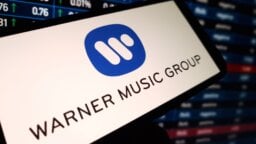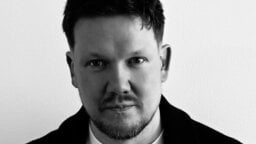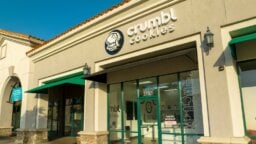In 1978, when Mr and Mrs Peterson went on holiday to celebrate their wedding anniversary, they left their 14-year-old son Gilles playing with his electric train set in the shed.
When they got back, he was still in the shed, but now playing jazz funk and disco (and some Supertramp, Peterson Junior wasn’t always too cool for school, especially when he was at school), having replaced the train set with a twin deck mixer that he’d bought from Sutton market on the never-never.
He soon set himself up as a mobile DJ, began building a record collection which, eventually, no shed on earth could hold, and started getting paid to play records he hoped other people might like. Something he’s been doing non-stop for the subsequent 45 years.
In that time he has DJ’ed in clubs around the world and on the radio – most notably via a 25-year association with the BBC.
He has also launched and led several labels, including his current passion project, Brownswood Recordings.
Earlier this year, Peterson and team announced a JV with Warner Music, reuniting him with the company’s global CEO of Recorded Music, Max Lousada, with whom he first bonded in the early 1990s over a love of French hip-hop.
The plan is to provide a more robust (and international) platform for Brownswood’s artists (including Yussef Dayes, Secret Night Gang, Kokoroko, STR4TA, Daymé Arocena and more), giving them the opportunity to make a more significant cultural impact, the sort of impact Peterson has been making himself and facilitating for others for decades, starting, in the recorded music world, with the launch of his first label in 1987…
How did the Acid Jazz label come about and what were the founding principles?
I had already spent a lot of time doing compilations, working with people like Morgan Khan at Street Wave, doing the Jazz Juice series and putting out compilations with Blue Note with Tony Wadsworth.
Tony was quite important to me at that time, because he saw that there was this young lad who was spearheading a sort of alternative DJ scene, through pirate radio and clubs, championing the more jazz-influenced side of that culture.
Eventually, there was enough of a movement for bands to grow out of the scene that me and other DJs were building. Acid Jazz, the label, was sort of the culmination of all that.
“I was on a mission for the scene to be global, and the only way to do that at the time was to work with Phonogram.”
I thought the label up with my mate Rob Gallagher from the group Galliano and then we found Eddie Piller, who basically would come to my show at Radio London, on a Tuesday night, trying to push this James Taylor stuff on us. It was a bit too mod for me, but I loved Eddie, he got shit done.
We’d made this record, Frederick Lies Still, by Galliano, which was a re-working of Curtis Mayfield’s Freddie’s Dead, and I asked Eddie where we could get it pressed. He took care of all of that and that was the start of Acid Jazz.
It quickly got to a point where groups like Jamiroquai, Brand New Heavies, The Young Disciples and Galliano were beginning to make sense, and to get followings. At which point I got headhunted by Nick Angel at Phonogram.
At that time, I was on a mission for the scene to be global, and the only way to do that at the time was to work
with Phonogram.
In a way, I kind of let go of Acid Jazz to do something that was bigger and more wide-ranging in terms of representing a contemporary, alternative club culture.
And that was Talkin’ Loud, of course.
That was Talkin’ Loud, right. Now, when I look back on it, it’s a shame that there wasn’t a Dave Robinson-type figure at that time to kind of go, ‘Actually Giles, you’ve got this entire movement and culture that you’re promoting, that is really happening, and I think we can do it on our own, independently’.
But that person, that mentor, didn’t really exist for me. So it was easier and more straightforward at a time before boutique labels were so common in major labels, to go with Phonogram.
As a result I found myself overnight in A&R meetings run by Dave Bates talking about Metallica and Tears for Fears, thinking to myself, ‘What the fuck have I done?’
But Talkin’ Loud had great success, so do you think it was the right thing to do?
It was amazing, but incredibly stressful. I’m DJ-ing five nights a week, I’ve got residencies in Vienna, Germany and Paris as well as all over the UK. I’m on Kiss FM and Jazz FM. And I’m running a label. But it was incredibly valuable to understand how the industry worked on a global level.
Some of the conditions were difficult at that time, and very difficult to understand the internal politics, but over the period of 10 years, I think we had six Mercury-nominated acts, which is amazing. It definitely developed the scene and allowed the music to get a platform in America.
How long were you there?
Three years too long! About 11 or 12 years.
Like I say, the person who made the first contact with me was Nick Angel, who went on to become head of Island, and he kind of got what I was about, he was a fan of the subculture.
And the person who brought me in officially was a guy called Hein van der Ree, who was the MD at the time. He was great, he charmed me, offered me a car and a wage, which was more than I’d ever had before.
But then he was fired, or he left, and I did find myself in those A&R meetings with Dave Bates, who had a reputation that was quite hardcore. Suddenly this little lad with a bunch of jazz artists is in the room, which was not really what he wanted.
I got, shall we say, a lot of trauma in those years, but that trauma was really important for my foundation, and I learned a lot from it. I saw how the other side of the industry was working at that time.
It was very difficult to make Phonogram see the bigger picture of what it was that I was representing; it always felt like we were fighting against a lot of obstruction.
But, we also signed some significant acts and put out some great music. We could have signed more! Everyone wanted to sign to Talkin’ Loud at that time, groups like Basement Jaxx and Zero 7, but I couldn’t get them past the
A&R department.
Eventually, I pulled out of the label, got onto Radio 1, did that for a few years. Then I was doing a residency at a club called Cargo in East London where someone gave me a CD of a jazz singer called José James doing a version of a John Coltrane song called Equinox, and I wanted to put it out as a record.
That was the catalyst for me setting up a new label, Brownswood with Simon Goffe and Emily Moxon, which is a real passion project. Quite early on we signed Ben Westbeech, we signed Ghostpoet, we put out his first album [Peanut Butter Blues and Melancholy Jam, 2011], which was Mercury-nominated, and The Heritage Orchestra, who of course went on to work with Pete Tong [on No. 1 album Classic House, 2016].
You recently did a JV deal with Warner for Brownswood. How did that come about and what possibilities does it open up for the label?
Well, it’s obviously been fantastic to work with Tony [Harlow, Warner Music UK CEO] and Max [Lousada, CEO, Recorded Music, Warner Music Group], who I’ve known for quite a while, since the Zero 7 days in fact.
In fact, funnily enough, when Max was a student in Brighton, he used to bring me all these French hip-hop records that I would play. We’ve had a friendship from there and of course he’s gone on to have this incredible career.
About three years ago, they approached us and talked about the possibility of a joint venture, which from Brownswood’s perspective was perfect, because it allowed us to carry on doing what we’re doing as an independent, but to upscale certain artists. That’s already making sense with someone like Yussef Dayes.
What is it you like about how Warner Music work?
Primarily, I like the people I’m working with. I’ve got a lot of history with Max and I’ve got a lot of history with Tony, so I’m feeling a lot more safe and comfortable with them around.
It’s a perfect match for me. I don’t think many other labels would have necessarily suited us, because the thing about Tony and Max is, they really understand the brand, my brand, and what it is that I bring.
“It’s a perfect match for me. I don’t think many other labels would have necessarily suited us.”
My thing was more, ‘Are you sure we’re right for you?’ Because obviously there’s a big difference between Ed Sheeran, Dua Lipa and, say, Emma-Jean Thackray.
But, actually, it makes total sense. They’ve got a great label in America, Nonesuch, which has a rich history and could suit some of our acts really well.
Switching to radio, how important do you think the pirate stations, and then Kiss FM, were in laying the foundations for the modern UK dance music scene?
I think that if you look at dance music in all its forms today, what makes the UK different to the rest of the world, and a leader in dance music around the world, is the relationship between the clubs and radio.
They influenced each other, the same DJs were involved, radio spread the word out from the clubs, and that continues to this day with the online stations and the communities that come out of that.
I’m super grateful that I basically started off in my garden shed, made it to Radio 1, and now 6 Music, plus my own online station, Worldwide FM.
I don’t know how aware you are of this, but it’s 25 years this year since you joined the BBC…
We should do something about that!
Absolutely! How has working at the corporation changed during those 25 years?
Obviously, a lot has changed. I was very lucky to have started off on air after John Peel, so I was handed over this already amazing audience.
And I was also lucky to have been on Radio 1 when it was still a station that could break artists on its own. There was all this music that I was championing and I could see the effect it was having around the country. That was a magic moment and I loved it.
Then, when there was a big change at Radio 1, I ended up being pushed to the middle of the night and I had a hissy fit. They were basically saying my time
was up.
But luckily 6 Music offered me the Saturday afternoon slot and I’ve been there 10 years now. I’d never done a daytime show before and I didn’t realise how different it was. Because everyone is in their own little bubble, and things will be happening over there that you’ve got no clue about unless your algorithm pushes you there.
So, to broadcast on a platform where, every time I do the show, I know there’ll be people who just happen to tune in, that’s fantastic for me.
I also don’t think there’s any other broadcaster in the world that would allow me to go on and play the mix of music that I play. Every week when I walk up Great Portland Street, I’ve got a bounce in my step because I realise that I have the most amazing opportunity there.
Which DJs have you admired – over the years and today?
Oh my God, I mean there’s so many. I tell you who I think is really significant right now, and that’s Jamz Supernova.
As an entrepreneur, as a thinker, as a communicator, as a representation of edge, diversity and the modern way of approaching the industry, she’s really inspirational.
She’s on before me, I listen to her on the way in, and to be honest sometimes she takes some of my confidence away, because she’s so good!
Also, she can DJ live; she’s a club DJ first. Her mixes on 6 Music, she does them live.
Do you think streaming has been good for finding larger audiences for the sort of artists from all over the world that you’ve always championed?
I think there’s still a lot to be said for nurturing audiences through club culture and radio, but then that audience gets from A to Z a lot quicker.
You know, it took me a few years to get from Supertramp to Herbie Hancock. Now you can get there in a couple
of nights.
And, as a label, it’s allowed our artists to reach new audiences, but I think it’s really important for us to continue to fuel the foundations. You can’t just wait for the algorithm.
In terms of a mass market, the algorithm has already won, but for more specialist stuff, I don’t think there’s ever been a more important role for the curator.
That’s why I think a lot of the big institutions are looking for specialists, for people who’ve lived the experience and have a lifetime of algorithms in their head, making the connections the machine-made algorithms will never quite get to.

MBUK is available via an annual subscription through here.
All physical subscribers will receive a complimentary digital edition with each issue.Music Business Worldwide





